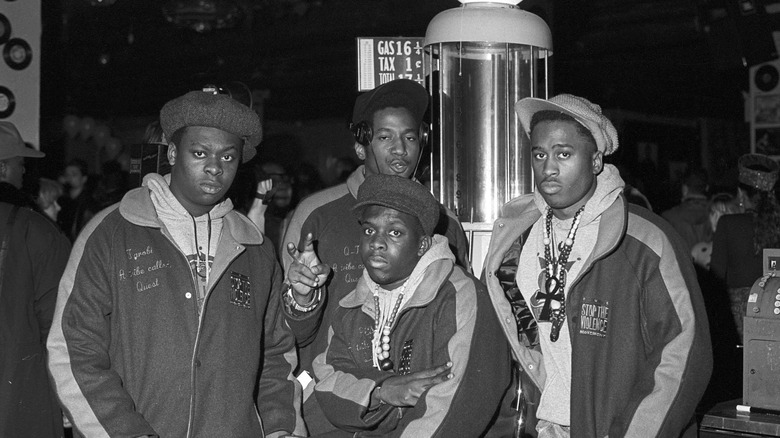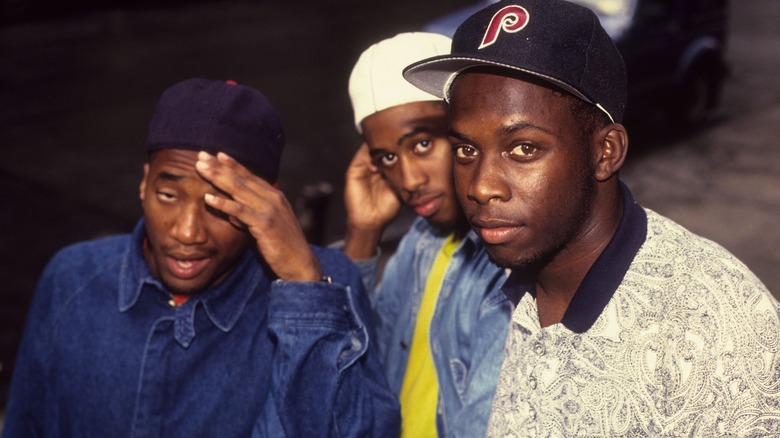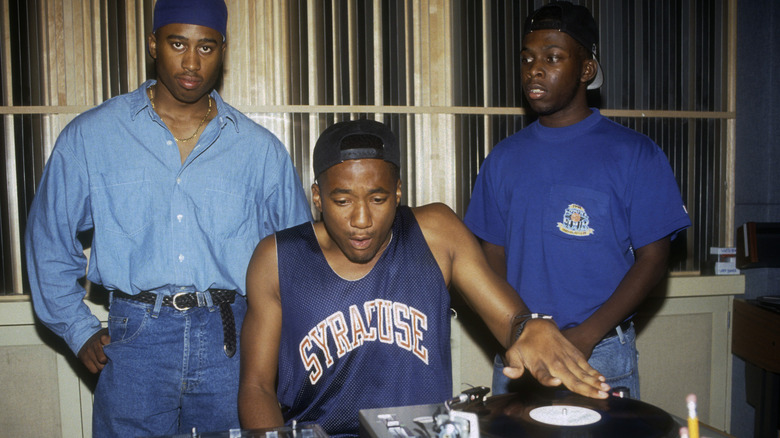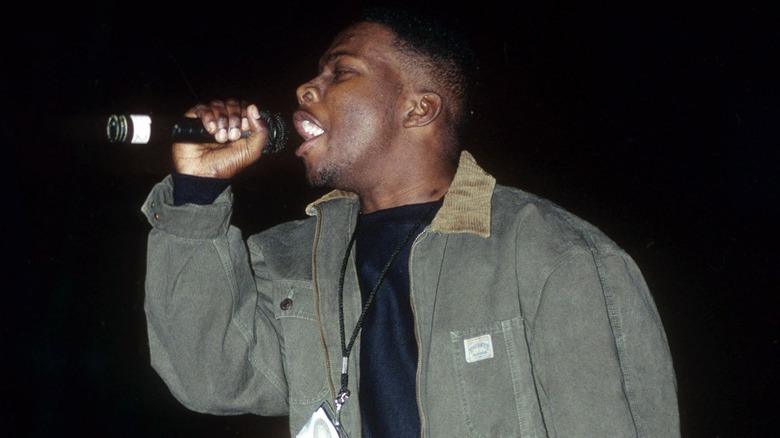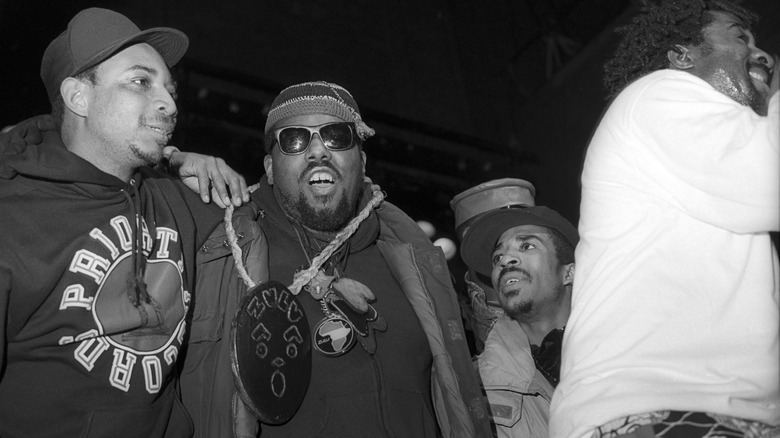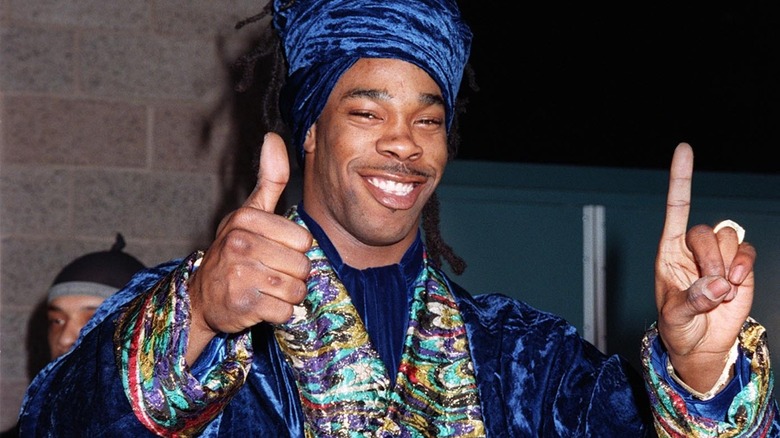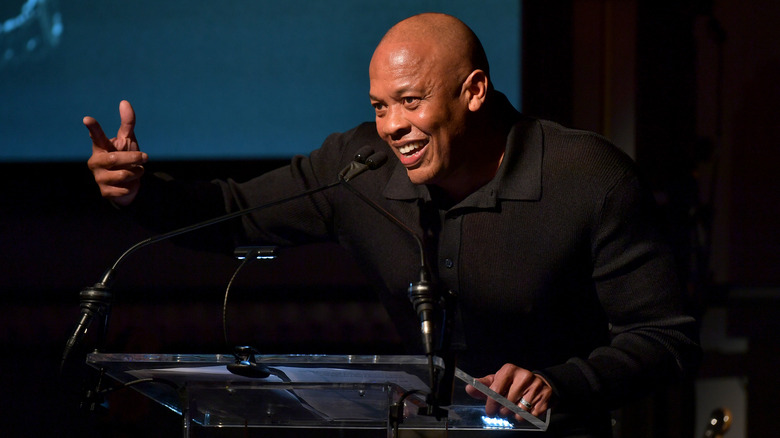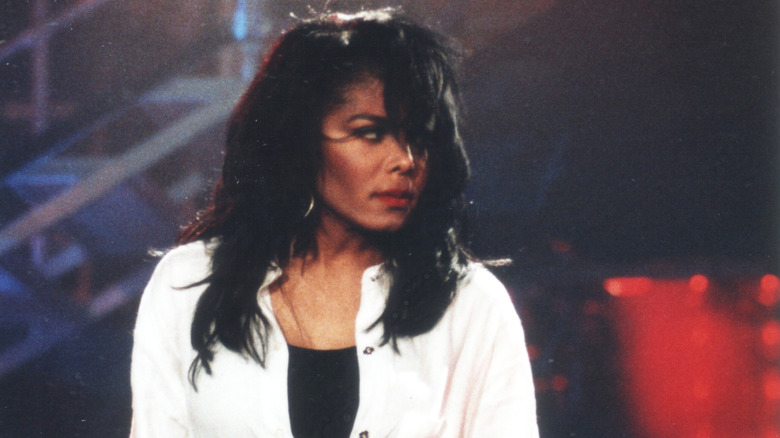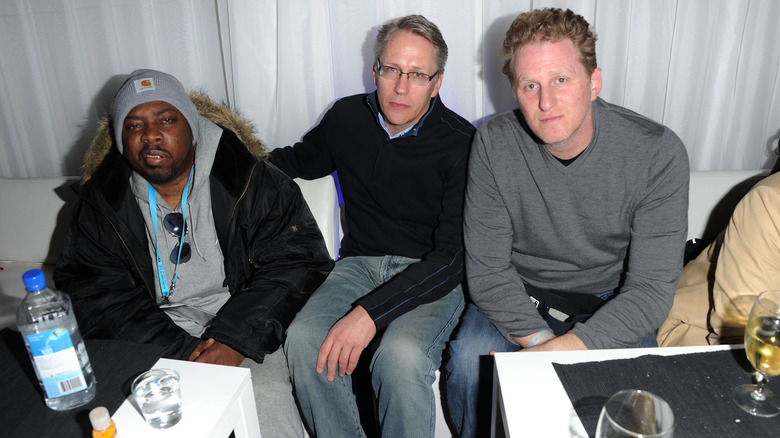The Untold Truth Of A Tribe Called Quest
A Tribe Called Quest is one of the quintessential bands within the hip-hop genre. Consisting of four core members: Phife Dawg (Malik Taylor), Q-Tip (Kamaal Ibn John Fareed), Ali Shaheed "Mr." Muhammad, and Jarobi White, the group put their stamp on the music industry with their trademark of infusing jazz, Afro-beats, and rap into a unique new sound that would later be emulated by many artists such as Erykah Badu, Common, and Jill Scott.
ATCQ achieved global success and became a contemporary inspiration to groups like the Roots and the Fugees. They were also part of the Native Tongues, a collection of hip-hop artists in the late '80s and early '90s. The group also helped establish fashion trends that are still around today, like Phife Dawg's iconic throwback jerseys.
After their influential, albeit short-lived, stint together as a group, they also became successful in their independent endeavors by the late '90s. According to ATCQ's website, Jarobi left the group early and became an executive chef and restaurant manager. Q-Tip went on to produce albums for multi-award-winning artists like Mariah Carey, Whitney Houston, Kanye West, and John Legend. Ali Shaheed Muhammad co-founded music trio Lucy Pearl along with Rahael Saadiq and Dawn Robinson. Pfife Dawg released a solo LP, "Ventilation," and continued producing multiple projects with ESPN, the NBA, and the NFL. He is notably responsible for the Dallas Mavericks' theme song, "Mavericks Phire."
However successful their individual pursuits may have been, though, nothing can compare to their time together as A Tribe Called Quest.
East Coast beginnings
All four members of A Tribe Called Quest were New York natives, with Q-Tip, Phife Dawg, and Jarobi hailing from Queens and Ali Shaheed Muhammad from Brooklyn. Their original name was QUEST, with the prefix given by one of the group's high school friends. They began making music together in 1985.
The group were childhood friends, which may have partially been the reason for their successful dynamic, according to author Hanif Abdurraqib, who wrote the book "Go Ahead in the Rain: Notes To a Tribe Called Quest." Abdurraqib's deep admiration for the band shines through when he describes his musical heroes and their "keen understanding of jazz" early on. "They were borrowing from ancestors, but also honoring that borrowing by understanding that they were not the first to attempt the type of sounds they were going for," he told Wisconsin Public Radio in an interview.
Before their big record contract break, ATCQ formed a unit called the Native Tongues, along with fellow East Coast hip-hop artists Jungle Brothers and De La Soul. Their first record deal with Jive came in 1989. Early on, they rapped about social justice and consumerism but did so with an almost sardonic flair that became enjoyable to a mass audience. In only four years, the group produced three studio albums that are still widely popular today with hip-hop fans: "People's Instinctive Travels and The Paths of Rhythm," "The Low End Theory," and "Midnight Marauders."
The Low End Theory was groundbreaking
ATCQ's album "The Low End Theory" successfully infused jazz and hip-hop, garnering a new kind of audience, and introduced otherwise unexposed audience members to the hip-hop genre. It birthed new artists like Busta Rhymes and is hailed as "transcendent" by many music fans and critics alike, including Vibe.
Released in September 1991, the groundbreaking album not only solidified "the group's artistic legacy" but forever altered the conversation about the rap and hip-hop genres. Full of humor and optimism, "Low End" tackled many unflattering stereotypes of the genres head on. A Tribe Called Quest also proved their true musicianship and artistry by being able to combine Afrocentrism and many music genres with modern, progressive sounds. "They metaphorically drew comparisons between their lyrical gems and jazz players like Lonnie Smith, Grover Washington, Jr. and Ron Carter, the latter joining the Theory sessions to add his supple bass notes to tracks like 'Excursions' and 'Buggin' Out,'" writes Rolling Stone's Mosi Reeves.
The album's tracks also cover some pretty heavy topics, which include lyrical commentary on misogyny in "The Infamous Date Rape" and "Butter," as well as "rap's descent into brutalism" on "Rap Promotor" and "Show Business," according to a BBC review by Chris Jones.
Though the group had further success, "The Low End Theory" continues to stand out as their masterpiece.
A chance encounter with Phife Dawg on the subway
Growing up in St. Albans, Queens, in the 1970s, Phife Dawg, aka Malik Taylor, was most comfortable performing in school plays and in church, according to Rolling Stone. Eventually, he would gravitate toward writing poetry, which would prove a gateway into his hip-hop career.
Malik and Jarobi met when Jarobi's family moved to Queens in 1981. As neighbors, they began beatboxing and rapping together. From there, Malik introduced Jarobi to Q-Tip, aka Kamaal Ibn John Fareed, at his school's gym. "We played basketball every day," Jarobi recalled to Rolling Stone. "Hours upon hours. Inevitably somebody from around the way would be like: 'I heard y'all rap. Let's battle.' And we'd battle somebody every day."
The group would make their freshman album, but afterward, a good amount of time passed before they would meet again in the studio. Shortly before ATCQ began recording their sophomore album, Q-Tip had a run-in with Phife Dawg on a train leaving Queens heading to Manhattan. At the time, Phife Dawg was a teenager who didn't seem interested in pursuing music, but Q-Tip convinced him to collaborate.
Phife Dawg tragically died at the young age of 45 due to complications of diabetes in 2016.
A Tribe Called Quest's second album broke up the Native Tongues
The Native Tongues, a collective of hip-hop artists from the late 1980s to early 1990s including Queen Latifah, De La Soul, Monie Love, Black Sheep, Chi-Ali, Jungle Brothers, and A Tribe Called Quest, was tested during the recording of "The Low End Theory." Q-Tip's controversial decision to replace the Native Tongues' Red Alert with Russell Simmons' Rush Management created unrepairable rifts between De La Soul and ATCQ at the time.
The decision created long-lasting rifts with the Jungle Brothers as well. "Jungle didn't f*** with us [after the switch]. Everybody was hurt," Q-Tip recalled to Vibe in 2007 (via Rolling Stone).
What is most unfortunate is that the Native Tongues may have been one of the main reasons ATCQ became a success. Q-Tip's relationship with De La Soul led to headliner spots on tour. Some recall that Native Tongues was made out to be more of a collective than it really ever was. "It's kinda funny how people create this big thing about Native Tongues, when in reality, it really only stems off of one record — nothin' more than that," Dave from De La Soul remembered in an interview with Vlad TV (via Ambrosia for Heads) in 2015.
What's the Scenario?
"Scenario," the final track and one of three singles on "The Low End Theory," birthed Busta Rhymes' music career. At the time, Rhymes was a member of Leaders of the New School and only 19. The song originally featured De La Soul and Black Sheep, but their verses were left out of the released track. Not only did the song make Busta a standout rap star, but it's still thought of as one of A Tribe Called Quest's definitive hit singles.
"Scenario" was a collaboration of many different rappers, who all contributed to the lyrics and beats, including Charlie Brown and Dinco D of Leaders of the New School.
A tragic fact about the track is that MC Kid Hood, a friend of Q-Tip's, also made his rap debut on the remix but was beaten before being shot in the head just two days after filming the music video for the song's remix, according to Vibe.
No N.W.A, no Low End Theory?
N.W.A's classic hip-hop album "Straight Outta Compton" was responsible for lighting the spark that became A Tribe Called Quest's hit second album "The Low End Theory," according to Rolling Stone. During a car ride, Q-Tip and Ali Muhammad discussed their admiration for what Dr. Dre was doing for the genre, and they decided they needed to follow suit. "Straight Outta Compton" is known for creating a new "West Coast aesthetic" within the genre by "making key interludes out of samples of black comedy pioneers like Rudy Rae Moore." Ali and Q-Tip took notice of the group's unique technique.
"I remember driving with Ali, I was like, 'Yo, we gotta make some sh*t like this," Q-Tip recalled to Red Bull Music Academy in 2013. "Dre is such a master the way it was laid out." Down the line, Q-Tip joined the Roots in a tribute show in Chicago for Black Thought to perform tracks from "Straight Outta Compton."
Dr. Dre was also inspired by ATCQ
Inspiration flowed both ways in the early hip-hop era. West Coast N.W.A member Dr. Dre's successful 1992 album "The Chronic" was directly inspired by A Tribe Called Quest's "The Low End Theory," according to Daily Rap Facts. "Years later I spoke to Dr. Dre and he told me that hearing 'The Low End Theory' inspired him to make 'The Chronic,'" Q-Tip said in an "MTV News" interview (via Rolling Stone).
"The Chronic" features hip-hop heavy hitters like Snoop Dogg, Warren G, and Nate Dogg. It's an "imaginative crusade with half-truths so vibrant they blurred the lines of what was real [and] collapsed the distance between the lawless Los Angeles of the persona [Dr. Dre] created for himself and the real one," writes Sheldon Pearce of Pitchfork. It was Dr. Dre's first solo project and would prove to be his last project with Death Row Records. His split with the record company would cause contention with its other big star, Tupac Shakur, just a few years later.
Their song Georgie Porgie is notably homophobic
What was meant to be A Tribe Called Quest's sixth track, "Georgie Porgie," was ultimately rewritten and retitled as "Show Business" on "The Low End Theory" and is known as possibly the most homophobic song ever to almost be released by a major artist. The song could have become ATCQ's legacy, but they've been able to outshine the past controversy, even in our current climate. The originally intended song was meant to feature all three members of Brand Nubian.
So why did they name a song after a 19th-century English nursery rhyme? Apparently, the original "Georgie Porgie" rhyme was written about a homosexual sex scandal including King Charles I, according to Amino. Culture Trip has revealed lyrics in the original track, which included rhymes like "In the beginning there was Adam and Eve / But some try to make it look like Adam and Steve" and "What made you choose the path of the gays, oh why / Ain't got no reason, to hell with alibis."
Thankfully for us, and for ATCQ, the track never saw the light of day.
A Tribe Called Quest lent their unique sound to other artists
By 1996, A Tribe Called Quest's fourth album was out, and the group had reached legendary status. With a plethora of musical riches to go around, they began collaborating with artists like Faith Evans, Janet Jackson, and D'Angelo, influencing their sound with their trademark Afrocentric-inspired and jazz-infused vibe, according to Hip Hop Scriptures.
Q-Tip and late Detroit hip-hop artist Dilla, together known as The Ummah, produced the track "Got 'Til It's Gone" for Janet Jackson, easily invoking the flavor of ATCQ's album "Beats, Rhymes & Life." The song takes the chorus from Joni Mitchell's classic song "Big Yellow Taxi" and incorporates lyrics that make it more about romance than the originally intended message of urban development run amok.
Q-Tip makes an appearance throughout the track background, with a rap verse at the end. The song is really he and Janet playing the role of lovers lamenting their relationship, and it is rumored they may have had a love affair outside of the studio, according to Washington City Paper.
Beats, Rhymes & Life: The Travels of A Tribe Called Quest
ATCQ members were originally upset about the 2011 documentary "Beats, Rhymes & Life: The Travels of A Tribe Called Quest," directed by Michael Rapaport. Before the Tribeca Film Festival premiere, Q-Tip tweeted his discontent. "I am not in support of the a tribe called quest documentary," he wrote in response to a leaked trailer for the film he did not approve of.
Though Phife Dawg attended the Sundance screening, Q-Tip, Ali Shaheed Muhammad, and Jarobi sat it out, and they later went on MTV, further verbalizing their disapproval of the project. There was also some disagreement as to who would get producer credit.
Michael Rapaport claims his goal in making the film was to reunite the group. Needless to say, he was disheartened with the majority of ATCQ's feedback. "I knew I had to be ready to fight," director Rapaport told Rolling Stone. "I expected to fight the finances, the studios — even the subjects a bit. But I didn't know how bloody it would get."
Q-Tip ultimately supported the documentary, and oddly enough, the film did start the group discussing a possible reunion, which would come a few years later.
The reunion
A Tribe Called Quest would first reunite in 2004, when they headlined the Rock the Bells concert in Anaheim, California. A couple of years later, they performed sold-out shows around North America. Fast-forward to 2015, and the group commemorated the 25th anniversary of "People's Instinctive Travels and the Paths of Rhythm" and released a new album in 2016 shortly after Phife Dawg's death. With the album's release also came the news that it would be their last. Q-Tip said that Phife Dawg left the rest of the group a "blueprint" of what they needed to do in the studio.
The album was recorded at Q-Tip's home, where he had a private studio built. The trio that remained went on the media circuit, appearing on "The Tonight Show" and performing for various media outlets. ATCQ got heavily political, rapping about gentrification, reparations, the Dakota Access Pipeline at Standing Rock, and various metaphors about society and outer space, according to Pitchfork.
The hit song that sticks out to most, however, was "We the People," which became a sort of anthem for discrimination in America in the year 2016. The music video for the track was purposefully released the day before the 2016 presidential election.
A political statement
A Tribe Called Quest made a strong, unambiguous statement in 2017 at the 59th Grammy Awards when they performed their new release "We the People." They busted through a wall behind their fellow performers in a not-so-subtle metaphor on immigration, and they were joined by other prominent artists like Consequence, Anderson .Paak, and their old pal, Busta Rhymes.
"We the People" features a chorus with the lyrics, "All you black folks, you must go/All you Mexicans, you must go/Also you poor folks, you must go/Muslims and gays, boy, we hate your ways." ATCQ prefaced their performance by dedicating it to the late Phife Dawg and gave a message to the audience. "We'd like to say to all of those people around the world, all those people, who are pushing people who are in power to represent them, tonight we represent you," Q-Tip said, according to Global Citizen. They performed some of their greatest hits as well, including "Can I Kick It?"
Later in the show, Consequence and Busta Rhymes called out then-President Trump, referring to him as "President Agent Orange," and went further to criticize the current "political climate" and Trump's "unsuccessful attempt at the Muslim ban." Both Q-Tip and Ali Shaheed Muhammad identify as Muslim. Part of the protest performance featured Muslims walking out and standing onstage.
